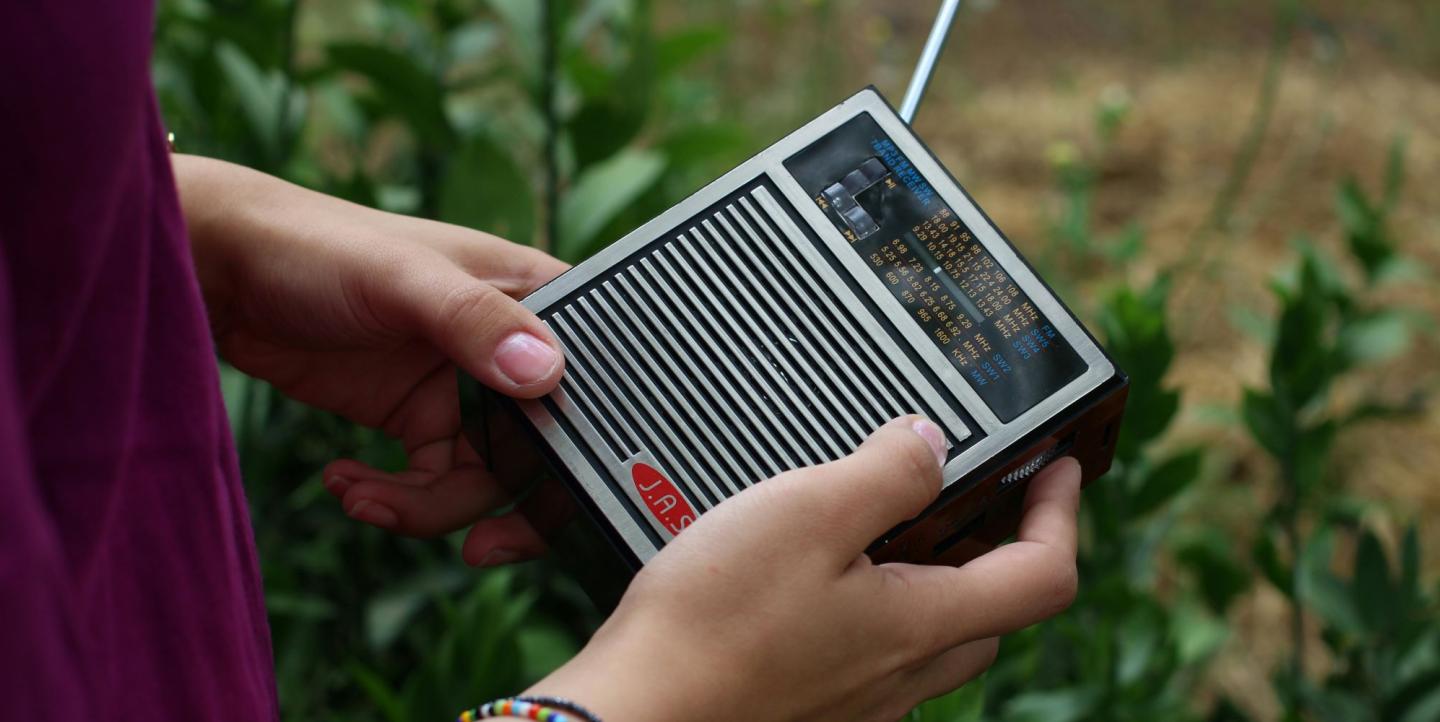This article was originally published by The Fix and is republished here with permission. Learn about the latest from the world of European media by signing up for their newsletter.
Russia’s censorship laws, adopted by the state after the all-out invasion of Ukraine in February 2022, shattered the Russian media landscape and forced most media outlets condemning the war and the regime to close down. For safety reasons, many journalists fled their homeland. Abroad, they started experimenting with new ways to keep reaching their audiences. One of them was to redefine the traditional radio format, turning it into a curated audio aggregator of first- and third-party podcasts – accessible as a streaming service on a downloadable phone app.
The Fix talked with Maksim Kurnikov, the head of Ekho Online, which was the first in the Russian media landscape to launch such a service, and Polina Filippova, the producer of podcasts of Radio Sakharov, which has been operating for a year.
Finding their “old” audiences
“Ekho Moskvy did not have a plan B,” says Maksim Kurnikov, the head of Ekho Online and the former deputy editor-in-chief of the project’s ancestor Ekho Moskvy, once one of the most popular Russian radio stations that stopped its operations only days after the start of the invasion. “Even if there were a plan B, it would be poorly implemented in wartime.”
In the following months, most journalists of the closed radio station started their own media projects – mostly YouTube and Telegram channels. “I realized that a very large part of the people, perhaps even the majority, did not find us on YouTube and other platforms because they didn’t use them as much, especially the elderly,” Kurnikov notes. “I thought we needed to do something that will not work like media-on-demand, but as a streaming media, which would be more familiar to our audience.”
They launched Ekho Online, their streaming app, in the autumn of 2022. At first, they only streamed content created by former Ekho Moskvy journalists on their new platforms, content which, alongside a news service, remains at the core of the project. However, soon other Russian media outlets operating in exile started reaching out to them, asking to add their audio content to their stream. Nowadays, they cooperate with more than 30 partners.
Radio Sakharov was also created to reach an established audience – people who used to follow the Sakharov Center, once a Moscow-based cultural hub dedicated to promoting human rights and the legacy of Nobel laureate and physicist Andrei Sakharov, shut down by the court in early 2023 “for illegally hosting conferences and exhibitions”.
When thinking about rebuilding a community that would foster discussions about the values of the closed center, its former employees favored the podcast format over a YouTube channel. “It was important for us that this was, as it were, not a directive, but rather an intimate conversation,” explains Polina Filippova, Radio Sakharov’s podcasts producer. They paired up with Correctiv, the German non-profit investigative newsroom, which already had experience building a podcast radio for #ÖZGÜRÜZ, a media platform covering Turkey, and launched their streaming app in May of 2023. Similarly to Ekho Online, it combines its content with podcasts from other partners, which are selected based on the philosophy of the Sakharov Center that was shut down.
Reaching audiences in Russia has its price
Ekho Online and Radio Sakharov are registered in Germany, but most of their audiences still reside in Russia. The figures span from 55% to 80%, depending on the platform.
While having such a prevailing reach within Russia is nowadays a positive sign, indicating that they managed to surpass the exile bubble, it also means that due to sanctions and tricks residents of Russia could face for supporting organizations unfavored by the state, they cannot rely on financial support from a greater part of their audience. Advertisement is similarly a very limited option.
To keep operating, Ekho Online and Radio Sakharov rely heavily on donor funding. They are, however, trying to find other income streams by setting systems for donations, organizing events in Europe and the U.S., and considering publishing books. Ekho Moskvy also established an online bookstore – which by itself is an increasing trend among Russian exile media outlets – and started selling merchandise.
Building a new media niche
Even though Ekho Online and Radio Sakharov follow the same media format, they don’t see each other as competitors. The two projects even paired up for the initiative of Reporters Without Borders to create a satellite package called “Svoboda” [Freedom], which can reportedly be accessed by 4.5 million households within Russia and about 800,000 in occupied Ukraine.
“When we were just starting this project, few people believed in its success. And the fact that similar projects started appearing immediately after ours suggests that we took the right direction,” says Kurnikov.
“Science teaches us that when the market increases, the market leader gains and does not lose,” he adds. “So far we see that the number of downloads of our application is increasing and the audience is growing.”
Kurnikov also notes that other media organizations started contacting him, seeking advice for launching projects with a similar format. One of the recent joiners to the market is also Antidot Radio, launched by Alexander Plushchev, a Russian journalist who remains a regular contributor for Ekho Online, often even with the same content.

